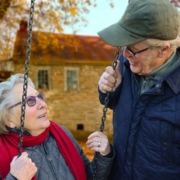The value of early cognitive assessment
Older adults’ relationship with cognitive examination and dementia screening remains complicated. The progressive nature of the disease and limited treatment options often lead older adults to forgo cognitive assessment until they feel they are facing serious cognitive issues which impact their daily life. It is true that often the early symptoms of dementia may go unnoticed and one should not underestimate the fear of getting tested for a disease that cannot effectively be cured. Until now the best option for older adults was to hope that they don’t develop dementia and wait for issues to appear before getting tested. Dementia experts however were growing tired of the “hope and wait” approach.
Not content with just diagnosing dementia and then trying to slow the disease progression, the global scientific community has led an effort to diagnose cognitive problems at an earlier stage, before a person develops dementia. Lately there has been a lot of discussion about mild cognitive impairment or MCI for short. But what is MCI? In essence it is a diagnosis that refers to the existence of cognitive problems beyond those expected due to age however it is not (yet) dementia. More importantly people with MCI can live autonomously and there is a good chance that their situation may be stabilized or even improved with targeted cognitive training activities. Furthermore intervention at the MCI stage is imperative as people with MCI are at a higher risk of progressing to dementia. In essence an MCI diagnosis is a call to action and an opportunity to avoid progression to dementia.
In order for this new approach to be effective though, older adults themselves must change their attitudes towards brain health. Awareness campaigns have highlighted the importance of prevention and regular testing for various diseases. Indeed when it comes to diseases like breast cancer we tend to be proactive instead of waiting for symptoms to appear. We should now apply that mentality to brain health and recognize that our brain is a complex instrument that needs to be monitored regularly as we enter old age. We are used to scheduling yearly blood tests and now it’s time we started scheduling yearly cognitive screening not just for dementia but also for milder cognitive issues such as MCI.
Nowadays we recognize that brain health is an issue that affects the whole of society therefore everyone should be involved in addressing it. Gone are the days of scientists working alone in dimly lit laboratories. If we want to defeat dementia we must step forward and take part in the struggle no matter if we are older adults, relatives or simply concerned citizens. A society-wide mentality shift can often be more effective than a thousand scientific articles and strengthening the ties between society and the scientific community can only lead to progress and better health for everyone.

What can I do?
- As an older adult: Maintain an active and healthy lifestyle. Make sure you integrate an annual cognitive examination in your preventive healthcare schedule.
- As a relative: Encourage your loved ones to examine their brain health yearly even if they feel healthy.
- As an assisted living / nursing home owner: Offer a yearly cognitive examination service for your residents. Offer cognitive training / rehabilitation programs for those residents with cognitive problems.



